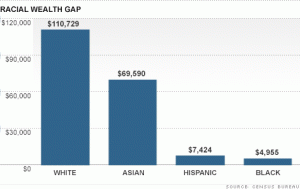“Remembering A Different King.”
This was the title of the presentation that Melissa V. Harris-Perry delivered in front of a packed UC Grand Room on Wednesday night.
As the keynote speaker for the 2014 Martin Luther King Jr. Commemoration, a week filled with events in honor of King’s legacy, Harris-Perry conveyed a message that not only praised his courage, but also pleaded for recognition of those who fought alongside him throughout the civil rights movement, such as Rosa Parks and Bayard Rustin.
Harris-Perry started with a picture of the MLK Jr. Monument in Washington D.C., and pointed out how he is displayed by himself with no other statues around him. She then brought up his arrest in Montgomery, Ala., for violating a boycotting law – a law that had been put in place as a result of previous activists – to give an example of how the civil rights movement preceded King’s efforts.
Harris-Perry later referred to King as an “unrelenting structural analyst” in the sense that he wasn’t exclusively fighting for equal rights; he was also pushing for economic justice. The presentation included several graphs that illustrated how the country is still facing some of the same economic challenges today. The first of which, was a line graph showing the importance of a college education. The data showed that the unemployment rate at its worst for college graduates is higher than the unemployment rate at its best for people without a higher education. The next slide painted a similar picture, only this time, the graph detailed the expanding wealth gap that exists between high-income whites and other racial groups.
Harris-Perry’s point in bringing up these statistics in relation to King is that if people link an entire movement to one individual, they will then start to look for individual causes for current issues. She cited a recent Heritage Foundation article that argued marriage as the reason why people are poor. Instead of examining structural reasons for the wealth gap, the solution being offered is to simply get married.
“If we get King wrong, we get our own circumstances wrong,” warned Harris-Perry of associating the entire civil rights movement with one person.
Dr. Heather Talley, a sociology professor at Western, sees an individual’s actions as a catalyst for other people to get involved. “The change depends on the actions of the great many,” said Talley. “One of the things most regrettable about how we remember MLK is that we see him as a civil rights leader whose overarching goal was to expand civil rights, but he was radical in ways we forget.”
Talley said that she views King’s hard work as an attempt to induce a dramatic overhaul of political and economic systems. “I think that idea scares people, so we have erased it from our memory of MLK,” said Talley. “We spend time re-enacting the ‘I Have A Dream’ speech, but we don’t spend equal thinking about how our actions violate the tenets of that speech.”
The result, as Harris-Perry presented, is a remembrance of MLK as the king, rather than one of many – a narrative that she said even King himself would hope to change.
For more information about Melissa Harris-Perry, visit here.
For a schedule of the remaining MLK Jr. Commemoration events, visit here.




